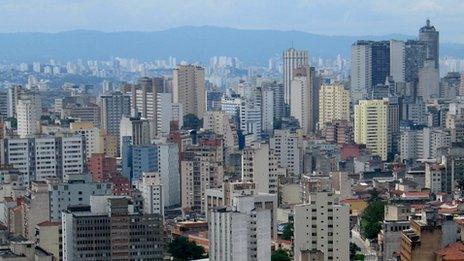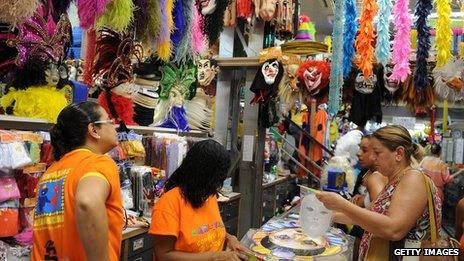Brazil economy loses ground again
- Published

Brazil's relapse in the economic league table is an unwelcome Christmas present
A year ago, Brazil´s overtaking of the UK to become the world's sixth largest economy was celebrated with enthusiasm by the Brazilian authorities.
At the time, in a boisterous mood, the Brazilian economy minister, Guido Mantega, predicted that France and even Germany could be soon left behind by Brazil's "large steps".
Today, however, forecasts suggest that the partying may have been premature. Or, at least, that the battle for this sixth place will be much harder than Brazilians expected.
According to the Economist Intelligence Unit (EIU), Brazil is set to fall in the world economic league table in 2012, going back to seventh position.
The UK will regain sixth place, says the EIU, despite the fact that the British economy is still struggling to return to growth.
"This is one more sign that what some call the Brazilian dream - and others Brazilmania - is now over," said Brazilian Marcos Troyjo, director of the BRICLab of Columbia University.
Currency crunch
According to EIU forecasts, the UK´s GDP will shrink by 0.1% this year, while Brazil's will grow by an unimpressive 1%, a stark contrast with the 7,5% growth achieved in 2010.
But the change in ranking in fact owes much to the strong devaluation of the real that reduced the country´s nominal GDP, as calculated in US dollars (using purchasing-power parity values, which take into account the cost of living, Brazil remains in seventh position, above the UK but below Russia).
The real, which was for years one of the most overvalued currencies in the world, has lost about 10% of its value in 2012.
"This should help exports in the long run, but it takes time. The most immediate impact is this detrimental effect on the GDP numbers," says Antonio Prado, deputy executive secretary at the Economic Commission for Latin America (Eclac).

Sao Paulo is Brazil's financial and industrial powerhouse
According to Robert Wood, EIU's chief economist on Brazil, this is yet more bad news for the country, which took a tumble this year in the eyes of international markets.
"The Brazilian dropdown reinforces the question of whether the country is doing enough to recover vigorous growth rates," says Mr Wood.
Estimates for Brazil´s growth were recently revised downwards, leading the EIU to forecast that South America´s largest economy will not surpass the size of the UK economy again until 2016, the year Brazil will host the Olympic Games.
"At the same time, in Britain there seems to be little to celebrate, as the country's advance in the ranking will probably be seen more as a consequence of the Brazilian fall."
Losing the number six slot is an embarrassing setback at a time when Brazil has been trying to leave behind its reputation as the "country of the future".
In recent years, the country´s economy has been boosted by a rapid expansion in government expenditure and policies to spur consumption.
An important consequence of these policies is that current unemployment rates are at a record low.
Poverty rates have also dropped dramatically and 40 million people are said to have joined a burgeoning new middle class that is still flocking to shopping centres around the country, despite a moderate drop in consumption levels.
But businessmen are not willing to invest - at least, not as the government expected.
Export hopes
Basic interest rates, in a country that for years had the highest in the world, have been systematically reduced and have now fallen to 7.25%, the lowest in recent history. This was done to alleviate the country's debt burden and to encourage investments in the real economy.
But the impact of cheaper loans on investments has not been immediately felt.
Currently, the rate of investment in the Brazilian economy amounts to about 18% of the country´s GDP. China invests almost 50% of its GDP and India more than 30%.
In Latin America, countries such as Peru, Chile and Colombia have also achieved investment levels of about 25% or 30%.
On the other hand, the same devalued real, that reduced the size of the economy as measured in dollars, is expected to help the country's industrial sector by making Brazilian exports more competitive.

Consumer spending has been sluggish recently in Brazil
Industrial exports, from aircraft to shoes, have increased in 2012, pointing to a rosier future.
Most analysts expect a recovery of the Brazilian economy in 2013, forecasting growth rates between 3% and 4%.
The government has launched a package of incentives to achieve growth and is also trying to accelerate infrastructure projects linked to the hosting of the 2014 World Cup and the 2016 Olympic Games.
Goldman Sachs' Jim O´Neill, who coined the acronym Bric to refer to the world's emerging economic powerhouses, is still optimistic. "But more reforms are needed to restore growth," he says.
In his view, Brazil still faces a wide range of structural problems, such as infrastructure bottlenecks, a stifling bureaucracy and a complex fiscal system that casts a shadow over the country's business environment.
- Published30 November 2012
- Published26 November 2012
- Published8 November 2012
- Published2 October 2012
- Published13 September 2012